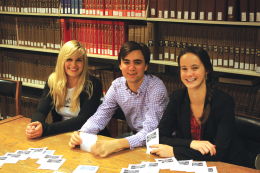
CONNOR BERNSTEIN FOR THE HOYA
After a failed university web server delayed the release of ballots by more than nine hours, voting for GUSA senators and the evidentiary standard referendum was still underway at press time early Friday morning.
According to Georgetown University Student Association Election Commissioner Ethan Chess (COL ’14), 2,509 students had voted as of 12:30 a.m. Friday, exceeding the 2,000 votes needed to make the referendum valid.
This election’s turnout is the one of the largest GUSA has seen on any student body-wide referendum, surpassing the record 2,463 students who voted on the Student Activities and Fee Endowment reform proposals last spring.
“We’re extremely pleased with the turnout,” Chess said.
Chess also expressed satisfaction with the successful use of HoyaLink to host the elections. This is the first time that the website, which was established at the start of last semester, has been used for aGUSA vote.
“It’s really quite advanced software that allows us to be 100 percent clear that every vote comes from the right person in the right district,” Chess said, explaining that HoyaLink pulls up the correct ballot for each student based on his or her NetID.
“I think this is going to set the future of GUSA elections on a new and better course,” he said.
Because of the delayed release of the ballot, polls will stay open until noon Friday.
An email containing a link to the ballot for the election and referendum was originally scheduled to be delivered to the student body by 10 p.m. Wednesday night, but one of Georgetown’s primary domain name system servers failed Wednesday afternoon, preventing the election commission from sending the email until 7:30 a.m. Thursday.
According to Chief Information Officer Lisa Davis, the server failure also caused a few thousand messages sent by outside addresses between 3:45 p.m. and 5:05 p.m. Wednesday to be returned to their senders or delayed.
Despite the postponement, GUSA Senate Transition Chair Nate Tisa (SFS ’14) said he does not believe the final result of the voting will be impacted.
“It’s unfortunate, but ultimately it doesn’t matter because this is an issue that students care enough to vote no matter what,” he said.
The referendum allows student to vote “yes” or “no” as to whether they support changing the Code of Student Conduct’s evidentiary standard from “more likely than not” to “clear and convincing” in all cases other than sexual assault.
However, the referendum has no legislative authority to alter the Code of Student Conduct.
In order for the change to be implemented, Vice President for Student Affairs Todd Olson must approve the proposal, but Olson has said that he will not make his decision until representatives from Loyola University of Chicago and Duke University conclude their external review of the Office of Student Conduct on Friday.
GUSA President Clara Gustafson (SFS ’13), GUSA Vice President Vail Kohnert-Yount (SFS ’13), the co-directors of the Student Advocacy Office and several resident assistants met with the external reviewers Thursday.
“[The reviewers] seemed to be very understanding of the challenges the students face in interacting with the code of conduct. …We talked a lot about personal experiences and how the system can be reformed to be more educational to the students,” Kohnert-Yount said.
Though the referendum does not have the power to modify the evidentiary standard, Gustafson said it is part of GUSA’s effort to show student support for the change.
“The more votes we get, the more clear and convincing the message that it sends to the university administration,” she said.
CORRECTION: An earlier version of this article incorrectly stated that the 2,509 students who voted in this election represented the largest turnout seen by any student body-wide referendum. A referendum in 2008 actually received more. The corrected version was posted at 11:45 a.m. Sept. 28.














